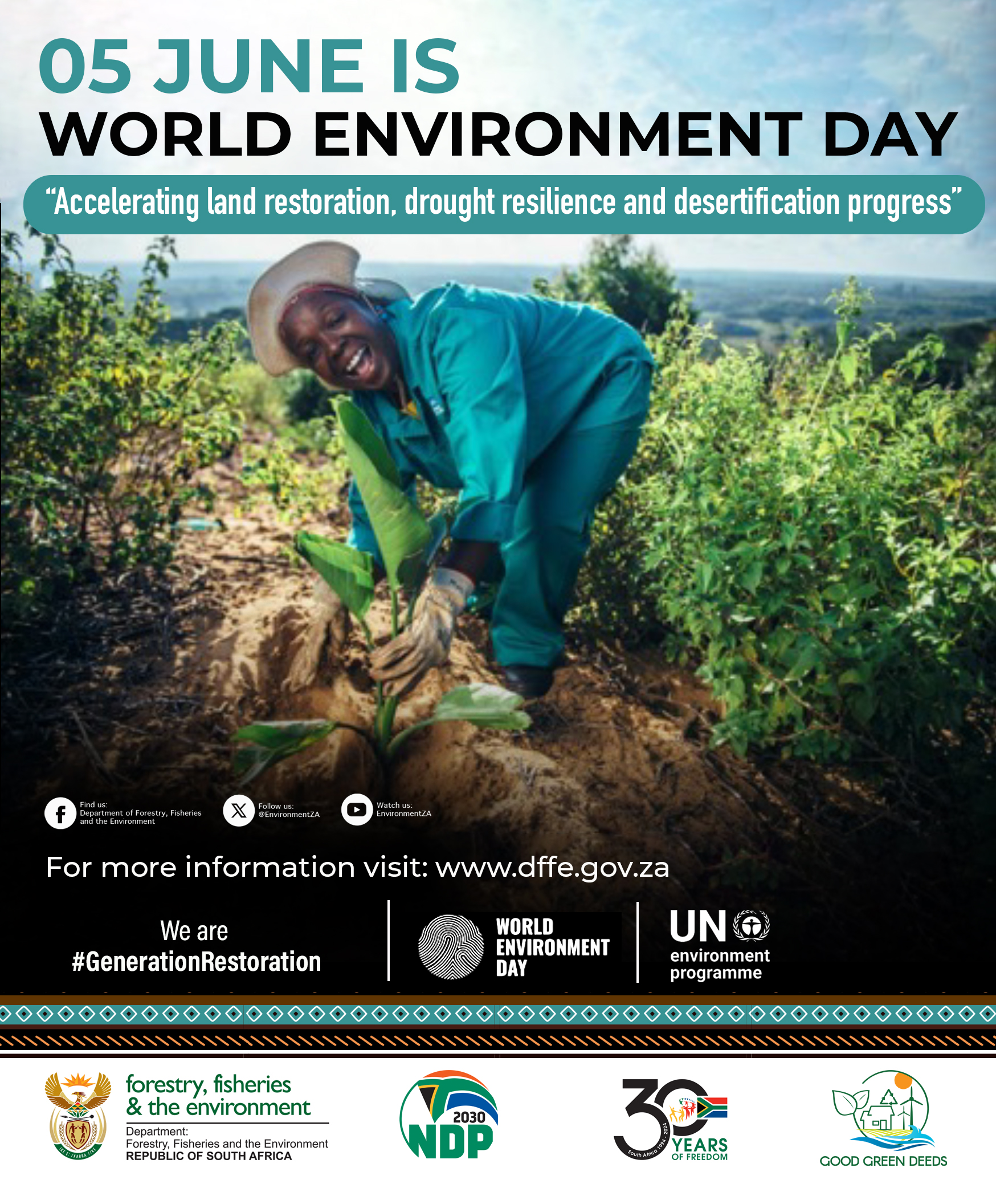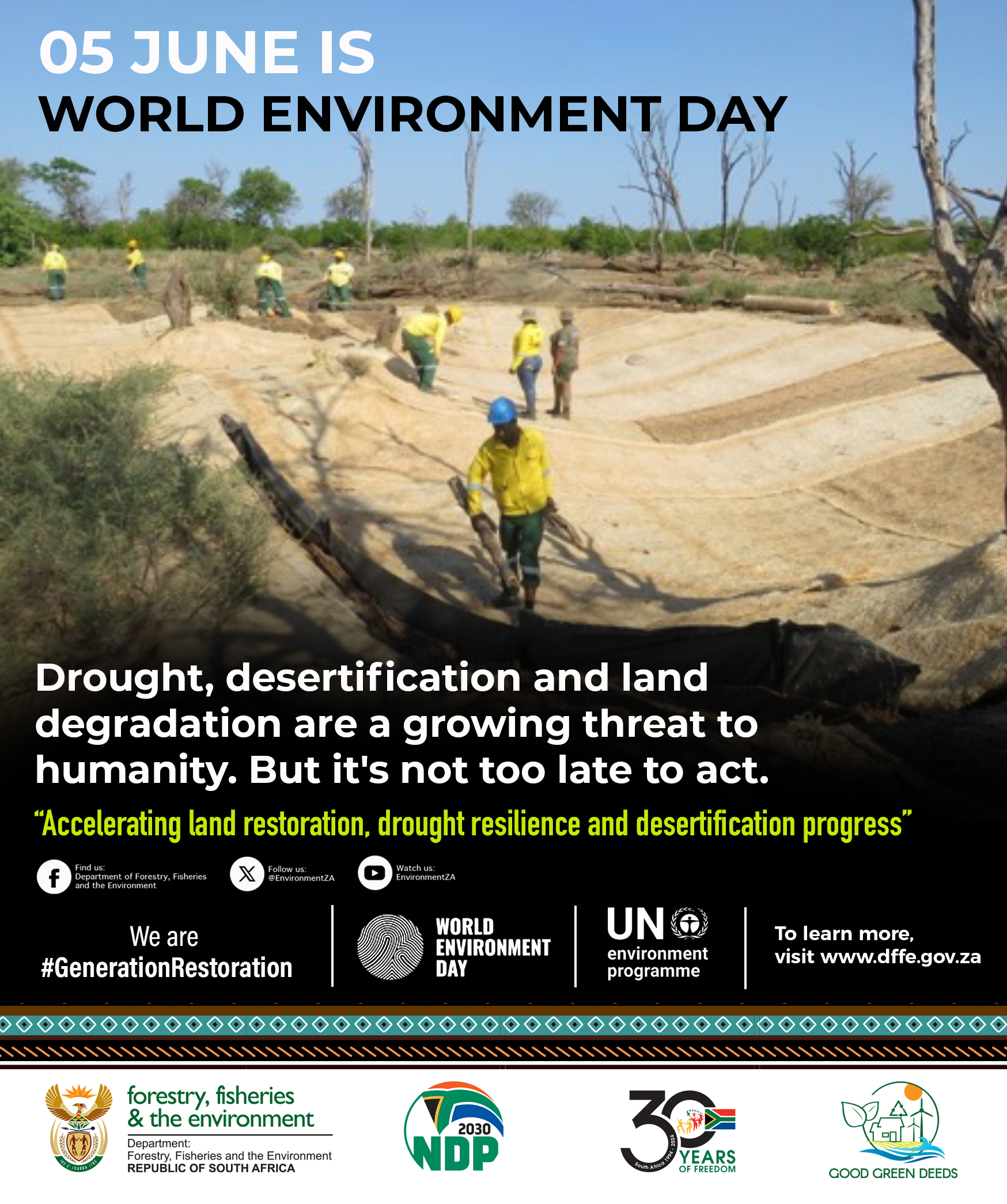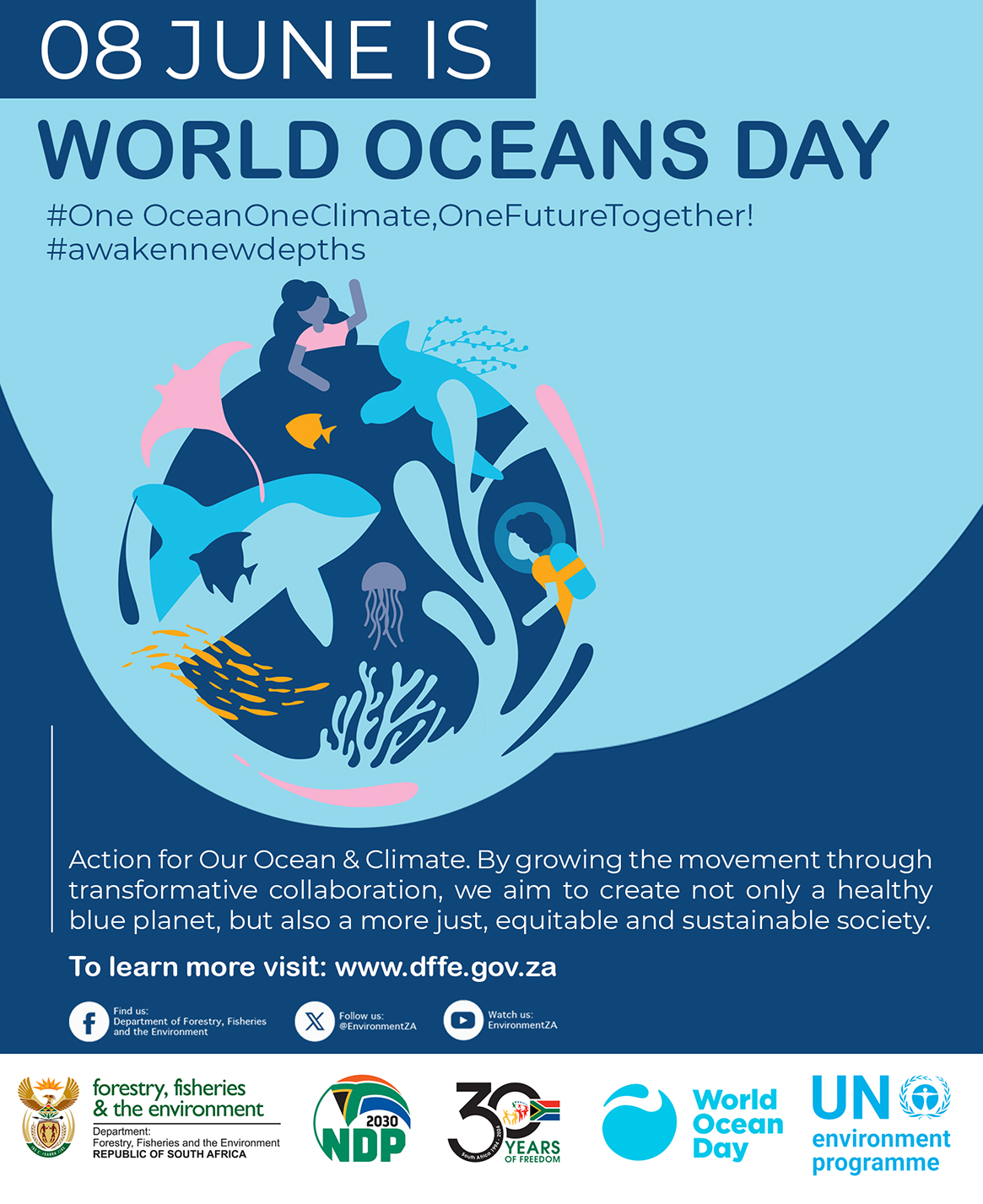June is Environment Month and involves celebration of World Environment Day on 05 June | World Oceans Day on 08 June | Desertification and Drought Day on 17 June
The year 2024 will mark the 30th anniversary of the United Nation Convention to Combat Desertification. The sixteenth session of the Conference of the Parties (COP 16) to the United Nations Convention to Combat Desertification (UNCCD) will be held in the Saudi capital, Riyadh, from 2 to 13 December 2024. The focus for both the World Environmental Day (WED) and Desertification and Drought (DDD) this year will be on issues of land restoration, desertification and drought resilience. The overall goal of both these occasions is to halt land degradation and promote sustainable land management practices by encouraging the public and decision makers to act towards protecting the environment, eradicating hunger and poverty. Hence a joint celebration for the two occasions.

WORLD ENVIRONMENT DAY (WED) is celebrated annually on the 5th of June and serves as a significant global platform for raising awareness and mobilising action to protect the environment. This year, WED will be commemorated under the theme:

This theme demonstrates the importance of accelerating the implementation of interventions such as projects and programmes which are aimed at addressing land degradation, desertification and minimizing the impacts of drought. The 2024 WED theme focuses on land restoration, desertification and drought resilience. This theme highlights that land restoration can reverse and minimise the impacts of land degradation, desertification and drought. Land restoration contributes to livelihoods and reduce poverty through the creation of green jobs, while also building community resilience to extreme weather events such as floods, drought and heatwaves. Land restoration also increase carbon storage which is significant to climate change adaptation and mitigation.
DESERTIFICATION AND DROUGHT DAY (DDD) is celebrated annually on the 17th of June as a platform to raise awareness about desertification, land degradation, and drought-related issues and to showcase human-led solutions to prevent desertification and reverse intensifying droughts. The DDD will be commemorated under the theme

The aim of this theme is to demonstrate the importance of land stewardship in bringing together all role players, partners, government, private sector, civil society organisation and youth structures in the fight against land degradation, desertification and drought.
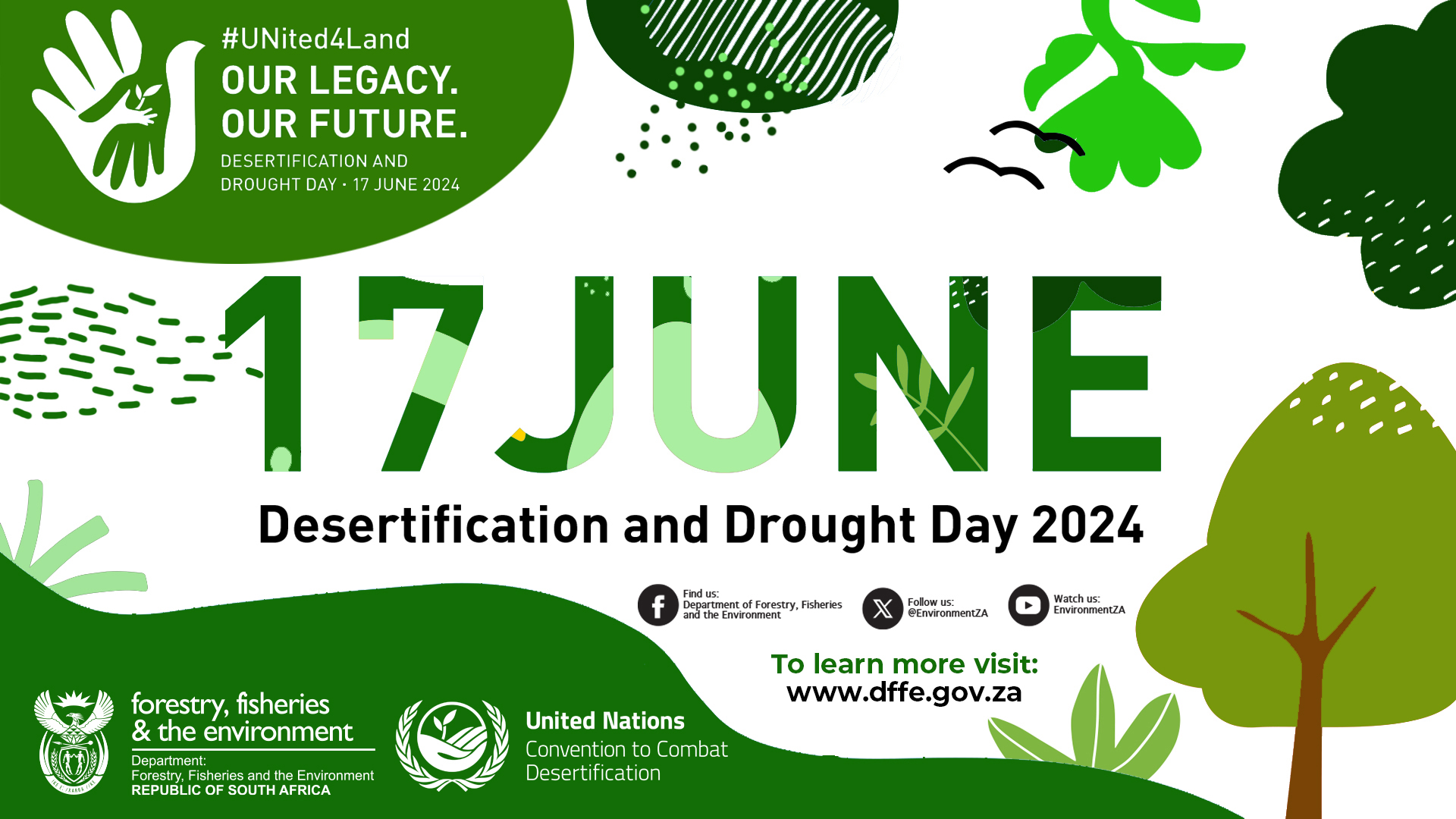
It should be noted that the celebration of the WED and DDD is aligned with the Global Biodiversity Framework target 2 which is aimed at ensuring that by 2030 at least 30 per cent of areas of degraded terrestrial, inland water, and coastal and marine ecosystems are under effective restoration, to enhance biodiversity and ecosystem functions and services, ecological integrity, and connectivity. In addition, the White Paper on Conservation and Sustainable Use of South Africa's Biodiversity particularly goal 1 is aimed at improving the conservation of South Africa's unique, rich biodiversity, including the diversity of land and seascapes, ecosystems, habitats, ecological communities, species and populations will also form part of this awareness activities.
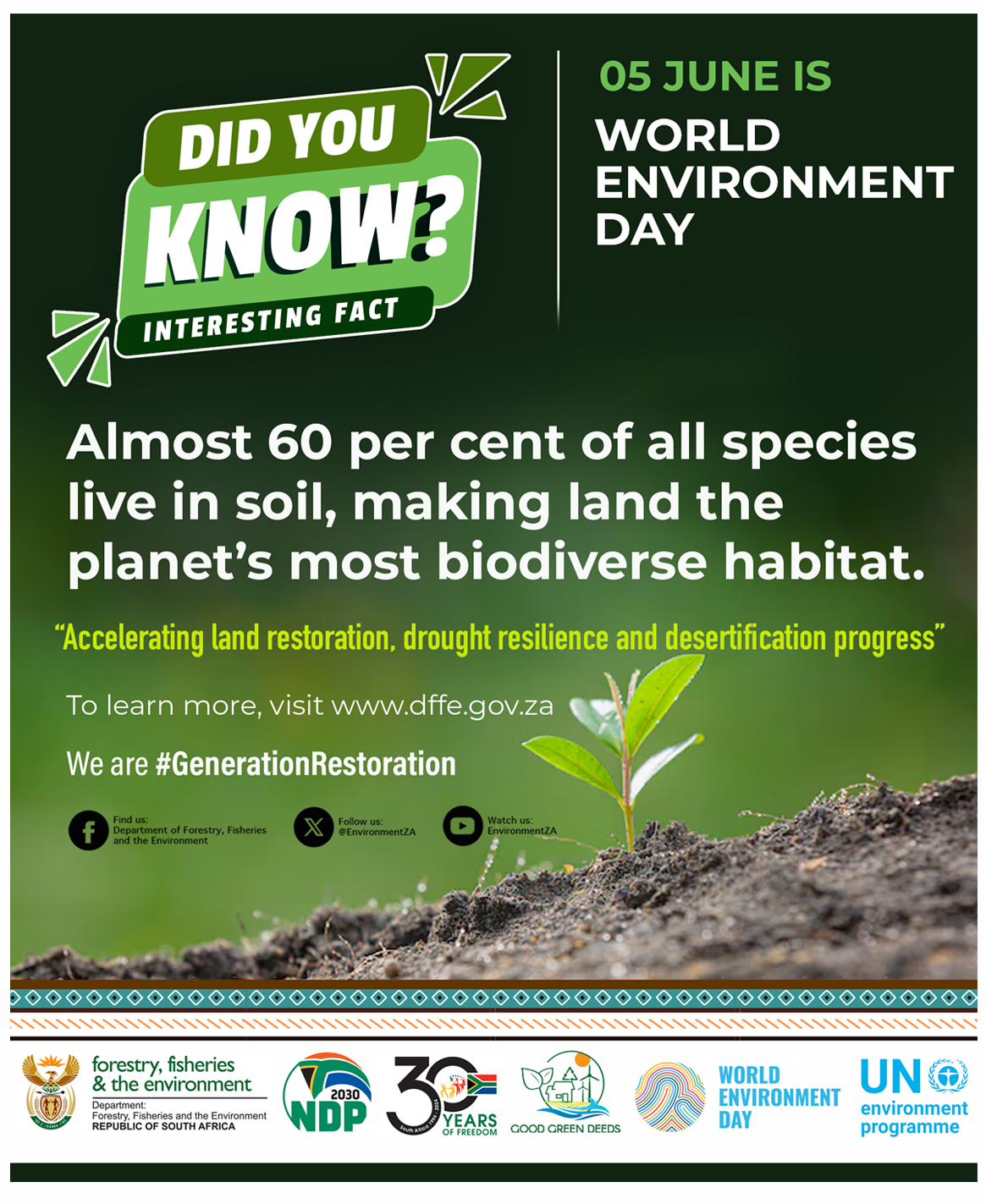
The joint commemoration of these days call for demonstration of national efforts aimed at combating environmental degradation, advocating for sustainable practices, and mitigating the impacts of desertification and drought on vulnerable communities and ecosystems.
THE PROJECT TO BE SHOWCASED ON THE DAY OF THE EVENT is Fetakgomo land rehabilitation located in Fetakgomo Tubatse Local Municipality under Sekhukhune District Municipality. The project is focusing on land rehabilitation programme to improve grazing for livestock and better living conditions for the community. This project is being implemented in Mohlaletse, Ga – Matji Village in the Limpopo Province. The project has restored and rehabilitated over 70 hectares of degraded land and employed 137 participants to undertake activities such as bush encroachment, water source development, re-vegetation (planting of seeds), sloping of dongas, fencing and earthworks.
Land resources such as soil, water, and biodiversityprovide the foundation for the wealth of our societies and economies. They meet the growing needs and desires for food, water, fuel, and other raw materials that shape the livelihoods and lifestyles.
The future of the land is at stake. Desertification, land degradation, and drought are among the most pressing environmental challenges currently, with up to 40% of all land area worldwide already considered degraded.
Land restoration is a proven and cost-effective solutionto help reverse climate change and biodiversity loss caused by the rapid depletion of our finite natural capital stocks. The land restoration agenda is a multiple benefits strategy that reverses past land and ecosystem degradation while creating opportunities that improve livelihoods and prepare us for future challenges.
Land restoration is about creating sustainable livelihood opportunities for people both small-scale farmers, indigenous peoples and local communities, businesses and entrepreneurs, women and youth to boost incomes, secure food and water supplies, and make individuals and communities less vulnerable.
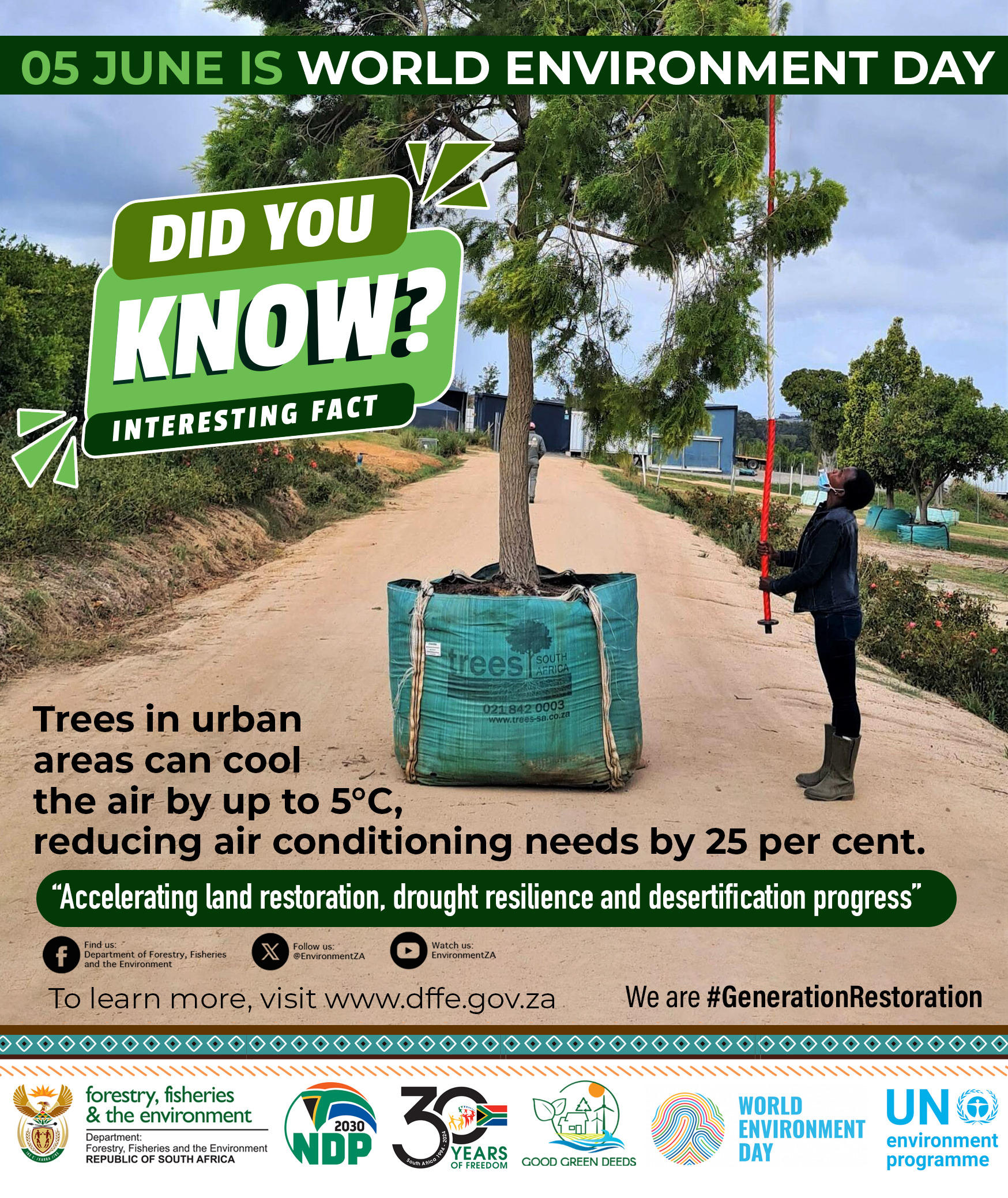
More inclusive and responsible governance can facilitate the shift to sustainable land use and management practices by building human and social capital. Increased transparency and accountability are prerequisites for integrated land use planning and other administrative tools that can help deliver multiple benefits at various scales while managing competing demands.
The stark implications of the business-as-usual scenario means that decisive action at all levels and from all actors is needed to realise the promise of the restoration scenarios.
Combating desertification, land degradation, and drought and achieving land degradation deutrality (LDN) is an effective pathway to accelerate progress towards achieving multiple Sustainable Development Goals by 2030.
The international community has pledged to restore one billion hectares of degraded land by 2030. This is only the start. The aim is to preserve nature's life-support services and safeguard the productivity of land resources for generations to come, reduce the risks and impacts of disasters and pandemics, and boost ecosystem and community resilience in the face of impending environmental stresses and climate shocks.
Caring for land is an intergenerational responsibility. For millennia, the ancestors had a deep connection to the land. However, this connection is fragile, with more and more people heading to cities and no longer choosing to live and work on land. The is a need to create employment opportunities for young people, especially in rural areas.
Land restoration is a shared responsibility everyone has a role to play because everyone has a stake in the future. Governments, businesses, communities and academic institutions, can restore together by seeking convergence and complementarity.
South Africa proudly joins the global community in celebrating WORLD OCEANS DAY (WOD) under the theme:

As a maritime nation bordered by three vast oceans — the Atlantic, Indian, and Southern — South Africa recognises the significance of our oceanic territory and the imperative to deepen our understanding and ensure protection of this invaluable ecosystem.
Objective of WOD 2024 is to highlight the vital role of oceans in shaping socio-economic realities and environmental sustainability. Oceans influence weather patterns, support diverse ecosystems, and provide livelihoods for millions of people worldwide, including 40% of South Africa's population residing within 100km of the coastline.
"The theme 'Awaken New Depths' encapsulates our commitment to explore and harness the immense potential of our oceans. Through concerted efforts, we aim to enhance our understanding of marine environments and promote sustainable use for the benefit of current and future generations," said Minister of Forestry, Fisheries, and the Environment, Ms Barbara Creecy.
Citizens are urged to play their part in minimising marine pollution by adopting sustainable practices such as reducing littering, participating in beach clean-ups, and recycling materials.


